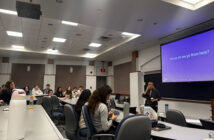
George Halal, ’19, center, is a Lehigh senior of Syrian and Lebanese descent. Halal is just one of a handful of Lehigh students who has been affect by President Trump’s travel ban, which has had an impact not only on family life but student life as well. (Courtesy of George Halal)
George Halal, ’19, has not visited his home country of Syria since 2012 because of the ongoing civil war.
He has not visited his family, now in Lebanon, since 2016 because if he leaves America, he runs the risk of deportation upon attempted return.
Halal said the Christmas and New Year’s holidays he now spends in America have been lonely and quiet — the campus is bare, and he doesn’t find himself surrounded by the comfort of family.
On Jan. 27, 2017, President Donald Trump issued an executive order that banned citizens from Syria, Iraq, Iran, Libya, Somalia, Sudan and Yemen from entering the United States for 90 days. Although the ban was initially blocked by district courts and rejected by federal appeals courts, a revised version was most recently upheld by the Supreme Court in June 2018.
President Trump’s travel ban has had a direct impact on international students at Lehigh, particularly those who cannot return to their home countries.
“Even though I am exempted from the travel ban as a student, I was advised by my lawyer to not leave the country, because Customs and Border Protection at the airport have the final discretion and the airlines have discretion before that,” Halal said. “There have been many cases where citizens of these countries were denied entry to the U.S., even when exempted from that law. Therefore, there is a high chance that I wouldn’t be able to re-enter if I leave.”
Despite not being able to migrate back to the Middle East, Halal is motivated to apply for his doctorate in physics and has made the most of his summer experiences. He spent last summer conducting research at Yale and the previous summer at both Ohio State and Lehigh.
Cheryl Matherly, the vice president and vice provost of International Affairs, said Lehigh’s international graduate student population has been affected by the travel ban more than the average American university.
At Lehigh, the rate of international graduate students is down 7 percent within the last year, exceeding the national drop off of 5.5 percent. Conversely, there was an increase in the rate of international undergraduate student enrollment.
Matherly said she and other Office of International Affairs staff are concerned about the decline in graduate students. She said international students have other compelling options to attend universities worldwide where they won’t face the risk of deportation back to their home countries.
Halal is not the only Lehigh student struggling to build a new life in America without knowing when he will see his family next.
Omid Ghazizadeh, ’22, a native of Iran, has also faced difficulties traveling between his home and the U.S.
“The ban has definitely made it a lot harder for me to go back to Iran and travel back and forth, and it’s almost impossible for Iranians to get visas to come here — even student visas,” Ghazizadeh said.
There are students at Lehigh from five of the seven nations impacted by the travel ban, which was upheld by the Supreme Court in a 5-to-4 decision. There are 35 students from Iran, nine from Iraq, one from Libya, one from Syria and one from Venezuela.
The current version of the travel ban has affected Lehigh’s ability to recruit students from those particular countries.
“The issues affecting international student recruitment are complex — certainly the executive order restricting visas for individuals from certain countries (such as Iran) has had an impact,” Matherly said. “It is also a problem that the U.S. is perceived as less welcoming and a harder place to study than in years past.”
Matherly believes there is more to the problem, and the challenge of recruiting international students extends beyond politics.
She said the U.S. is competing with other nations to recruit the most elite international students. Countries such as Germany, Australia, Canada and China invest heavily in their own universities in order to keep students close to home.
“We are paying attention to the international students and their return on investment for a Lehigh degree,” Matherly said. “That can mean students getting a job after graduation and ensure that they succeed beyond college.”





Comment policy
Comments posted to The Brown and White website are reviewed by a moderator before being approved. Incendiary speech or harassing language, including comments targeted at individuals, may be deemed unacceptable and not published. Spam and other soliciting will also be declined.
The Brown and White also reserves the right to not publish entirely anonymous comments.
2 Comments
Sadly, Trump’s contentious issue is yet one more thing that makes being an international student away from home difficult, compounded by our complex culture and language problems. Welcoming and assimilation assistance must come from numerous sources, including the White House, to aid these young people embarking on life’s journey. Most struggle in their efforts and need guidance from schools’ international departments, immigration protection, host families, concerned neighbors and fellow students, and even informative books to extend a cultural helping hand.
Something that might help anyone coming to the US is the award-winning worldwide book/ebook “What Foreigners Need To Know About America From A To Z: How to Understand Crazy American Culture, People, Government, Business, Language and More.” Used in foreign Fulbright student programs and endorsed worldwide by ambassadors, educators, and editors, it identifies how “foreigners” have become successful in the US, including students.
It explains how to cope with a confusing new culture and friendship process, and daunting classroom differences. It explains how US businesses operate and how to get a job (which differs from most countries), a must for those who want to work with/for an American firm here or overseas.
It also identifies the most common English grammar and speech problems foreigners have and tips for easily overcoming them, the number one stumbling block they say they have to succeeding here.
Good luck to all wherever you study or wherever you come from, because that is the TRUE spirit of the American PEOPLE, not a few in government who shout the loudest! Supporters of int’l students must shout louder.
It;s very disappointing that you have taken this opportunity to write an ad for your book.